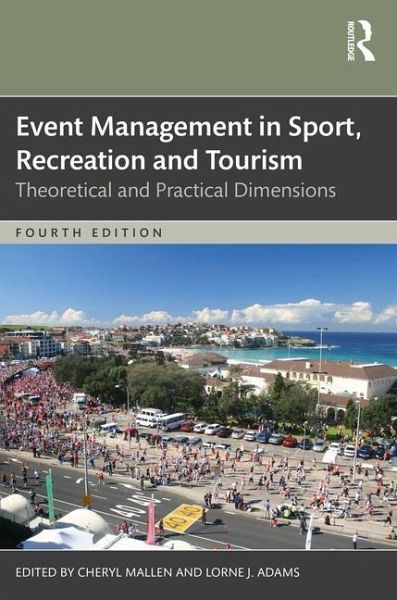
Event Management in Sport, Recreation, and Tourism
Theoretical and Practical Dimensions
Herausgegeben: Mallen, Cheryl; Adams, Lorne J.
Versandkostenfrei!
Versandfertig in 6-10 Tagen
54,99 €
inkl. MwSt.

PAYBACK Punkte
27 °P sammeln!
Now in a fully revised and updated fourth edition, Event Management in Sport, Recreation, and Tourism provides a comprehensive theoretical and practical framework for planning and managing events at all levels, from smaller local events to mega-events.Focusing on the role of event manager and their diverse facilitation responsibilities through each phase of the event planning process, the book is designed to encourage critical thinking, to help the reader to become an adaptable and capable manager ready to cope with the constantly evolving challenges of the contemporary events landscape. The b...
Now in a fully revised and updated fourth edition, Event Management in Sport, Recreation, and Tourism provides a comprehensive theoretical and practical framework for planning and managing events at all levels, from smaller local events to mega-events.
Focusing on the role of event manager and their diverse facilitation responsibilities through each phase of the event planning process, the book is designed to encourage critical thinking, to help the reader to become an adaptable and capable manager ready to cope with the constantly evolving challenges of the contemporary events landscape. The book begins with an updated chapter on the types of knowledge in event management, posing questions that help readers to understand their current knowledge, to decide what they need to pursue, and to advance their knowledge strategies. Containing a rich array of international, real-world case studies, data, and practical examples, from traditional and niche sport, recreation, and tourism contexts, this fourth edition is enhanced by a completely new chapter on practical advances in environmental sustainability that provides an overview of research as well as strategies for moving forward. The book goes further than any other event management textbook in placing social, ethical, and environmental responsibilities at the centre of the event planning process.
Event Management in Sport, Recreation, and Tourism is an essential reading for any student or practitioner working in event management, sport management, leisure management, outdoor recreation, or tourism.
Focusing on the role of event manager and their diverse facilitation responsibilities through each phase of the event planning process, the book is designed to encourage critical thinking, to help the reader to become an adaptable and capable manager ready to cope with the constantly evolving challenges of the contemporary events landscape. The book begins with an updated chapter on the types of knowledge in event management, posing questions that help readers to understand their current knowledge, to decide what they need to pursue, and to advance their knowledge strategies. Containing a rich array of international, real-world case studies, data, and practical examples, from traditional and niche sport, recreation, and tourism contexts, this fourth edition is enhanced by a completely new chapter on practical advances in environmental sustainability that provides an overview of research as well as strategies for moving forward. The book goes further than any other event management textbook in placing social, ethical, and environmental responsibilities at the centre of the event planning process.
Event Management in Sport, Recreation, and Tourism is an essential reading for any student or practitioner working in event management, sport management, leisure management, outdoor recreation, or tourism.














